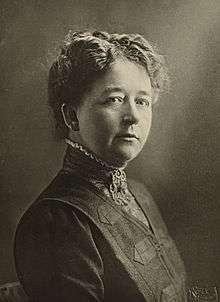Kristine Bonnevie
| Kristine Bonnevie | |
|---|---|
 | |
| Born |
8 October 1872 Trondhjem |
| Died |
30 August 1948 (aged 75) Oslo |
| Nationality | Norway |
| Fields | Cytology |
| Doctoral students | Thor Heyerdahl |
| Known for | First female member of the Norwegian Academy of Science and Letters |
| Influences |
Theodor Boveri Arnold Lang |
Kristine Elisabeth Heuch Bonnevie (8 October 1872 – 30 August 1948) was a Norwegian biologist and Norway's first female professor. Her fields of research were cytology, genetics and embryology.
Personal life
She was the fifth of nine children of Jacob Aall Bonnevie (1838–1904) and Anne Johanne Daae (1839–1876). Her family moved from Trondhjem to Kristiania in 1886.[1]
She did not marry.[1] Her sister Honoria was the wife of Vilhelm Bjerknes.
Career
Bonnevie took her examen artium in 1892, started studying zoology in 1892, later switching to biology. She completed her doctoral dissertation, «Undersøgelser over kimcellerne hos Enteroxenos østergreni» [studies on the germ cells of Enteroxenos østergreni] in 1906. She also studied under Arnold Lang in Zürich in the years 1898-99, under Theodor Boveri in Würzburg in 1900-01, and under Edmund Beecher Wilson at Columbia University in New York from 1906 to 1907. She succeeded Johan Hjort as leader of the Zootomic laboratory in 1900. She was a professor at Royal Frederick University from 1912 to 1937, and founded the Institute of inheritance research in 1916.
In 1911, Bonnevie became the first female member of the Norwegian Academy of Science and Letters. Later, she founded the Norwegian association for female academics, leading it in the years 1922-1925. She established a study home for young girls in 1916 and a students' house in 1923. Kristine Bonnevie was a member of the University's broadcasting committee from 1927 to 1937. Thor Heyerdahl was one of her students in the 1930s.
She was a central board member of the Liberal Left Party from 1909 to 1918.[2] She was elected as a member of Kristiania city council, serving from 1908 to 1919, and as a deputy representative to the Parliament of Norway in 1915. She served the term 1916–1918 as the deputy of Otto Bahr Halvorsen in the constituency Gamle Aker.[1][3]
Kristine Bonnevie received the King's Medal of Merit in gold in 1920, the Order of St. Olav, 1st class, in 1946, and "Fridtjof Nansen's reward" in 1935. The biology building on Blindern at the University of Oslo is named Kristine Bonnevie's House.[1]
References
- 1 2 3 4 Semb-Johansson, Arne. "Kristine Bonnevie". In Helle, Knut. Norsk biografisk leksikon (in Norwegian). Oslo: Kunnskapsforlaget. Retrieved 27 December 2011.
- ↑ Carstens, Svein (1987). Det Frisinnede Venstre 1909–1927 (in Norwegian). Trondheim: University of Trondheim.
- ↑ "Norges Offisielle Statistikk. VI. 65. Stortingsvalget 1915" (PDF) (in Norwegian). Statistics Norway.
- Stamhuis, Ida H; Monsen, Arve (2007). "Kristine Bonnevie, Tine Tammes and Elisabeth Schiemann in early genetics: emerging chances for a university career for women". Journal of the History of Biology 40 (3): 427–66. doi:10.1007/s10739-007-9132-x. PMID 18380054.
- "Kristine Elisabeth Heuch Bonnevie". Who Named it?. Retrieved February 2010.
External links
|